That whole climb, the fall awaited
We leave Henry and Katherine on their way down to pound town, and a montage starts up. The Tudors is fond of a montage, particularly in its finales. They’re a great way to review the state of the plot, pick up news about characters in a economical way, and, with Trevor Morris always up for kicking the score up a notch for the end of season, a sound way to build mood.
Anne gets long evenings of fear and sewing in Whitehall.

The score is very supportive of all this worry with threatening, sinuous strings. The camera takes a trip around Anne of Cleves, and she’s being illustrated as far more physically alone than a Queen of England in that period was ever likely to be, but it’s making a good point about her relative isolation at this time.
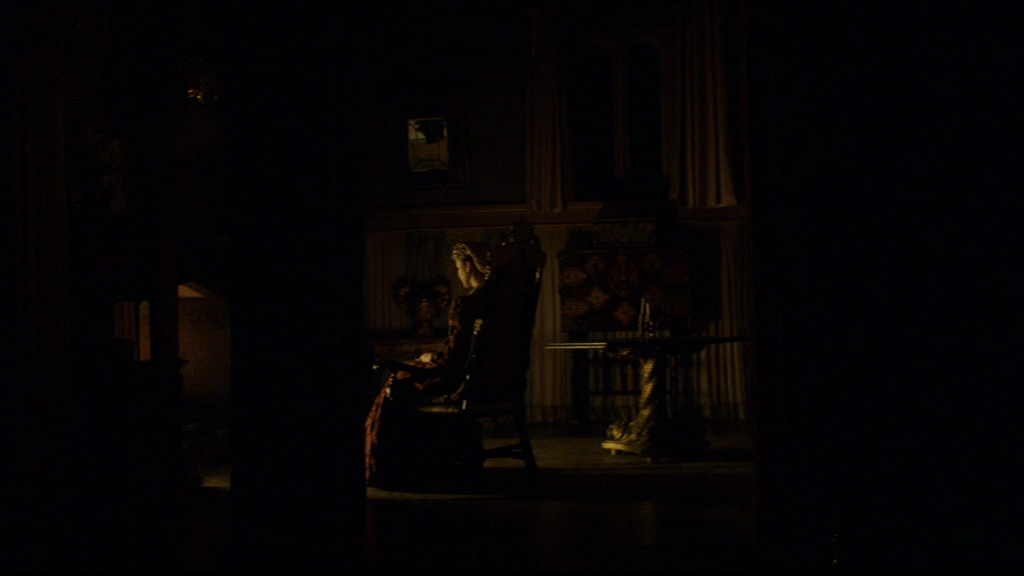
The camera rolls on past her and slides into the corridor set, as Bishop Gardiner knocks at an unspectacular door. Inside he finds a ‘total lack of pity’ party for Cromwell. Edward Seymour says he is just who they needed, and beckons him in.
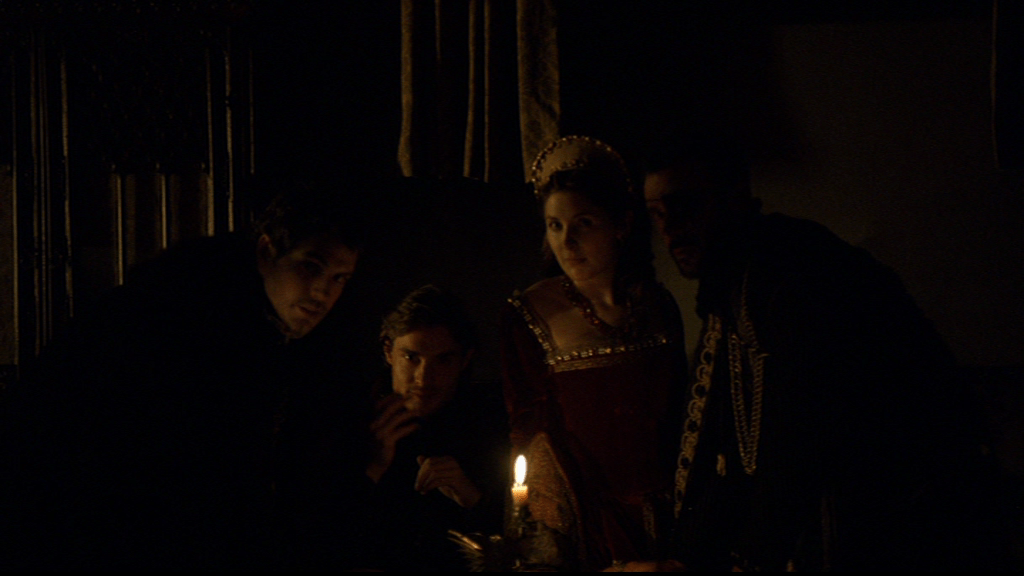
Those strings in the score start developing into something with a very steady impulsion and increasing grandeur as we go through the next few vignettes. Gregory gives his dad a scary moment as he walks into the room with a serious face but saying nothing. Turns out Gregory’s wife Elizabeth had the baby and it’s a boy. Cromwell is relieved and happy. Is it his final moment of repose and happiness? We have to be getting close.

Henry goes to Hampton Court and visits Prince Edward. Henry is intensely joyous at seeing his son.

I can’t tell if the drums starting up really give us a sense of impending historical moment, or it’s just that I know what’s coming, as Brandon and Seymour share a nod before what looks like a council meeting. And then it becomes clear that yes, it is that council meeting. It’s June 10th 1540, the day and the way that Thomas Cromwell fell.

In among the signals and the discussions, kept too close for the historical record to see, someone had convinced Henry to approve an arrest warrant for Cromwell. I think we can imply from that signal that The Tudors gives this role to Brandorfolk, and along with Bishop Gardiner Norfolk was the most involved. At the meeting it was Norfolk that spoke and told him not to sit because that wasn’t a place for traitors, Cromwell threw the hat he was wearing on the floor, there was some symbolic removal of ‘honours’, Norfolk removing the order of St George from Cromwell and a former ally (like until nearly that morning) of Cromwell’s, the lord Admiral, removing the garter of ‘Order of the Garter’ fame. But other than the actual historical report pretty much as The Tudors’ has it(1).

Of course, that actual historical report is from Marillac, the still relatively new and terrifically snobbish French Ambassador. Chapuys, it might be remembered, was still away from England. He would return in July, so the only ambassador reporting it without a lot of relish was the guy from Venice, who wrote to his leaders that Cromwell was going to meet the same fate as everyone that had once been in high favour with this King. (2) Venice knew what was up.
The scene particularly draws us into Richard Rich’s point of view, encouraging us to wonder what the hell he, and Cromwell’s other allies are going to do. He and Wriothesley tend to get a bad press for Cromwell’s fall, but all that I have found shows them as having been far more about detaching themselves from Cromwell once he fell, and, fair enough, then getting plenty of clear water between them and their former benefactor, and then doing pretty well for themselves while being morally dodgy for the rest of the reign. Wriothesley tended more conservative anyway, and appears to have moderated himself to accommodate Cromwell because he dropped right back in that faction, lockstep with Bishop Gardiner, and would end up being the owner of Cromwell’s great house at Austin Friars.
Also, there were some attempts at questioning, and either they were the most amazingly persuasive speakers, or other unrecorded signals had gone out from the throne. Because this didn’t become a faction purge. If Cromwell had got you your job then a lot depended on how you now acted, and later attempts to get rid of those who had been both closest to Cromwell and aligned in religion with him, attempts on Archbishop Cranmer, Thomas Wyatt and Ralph Sadler would all fail, and not through lack of effort from the conservative faction.

Cromwell would fall alone, and he ends the scene alone, in his cell. William Kingston was still the Constable of the Tower who Wolsey had been on his way to when he died, and who had hosted everyone to be executed there since, as well as the few that wriggled free. Cromwell would be his last big name prisoner before retirement (followed quickly by death), and it’s worth imagining just how awkwardly familiar everything would have been for Cromwell in the nearly two months Henry held him for.

Cromwell seems to have been surprised by the turn. He thought he had been doing well. Things might have been delicately poised with the King, but with old rival Lord Lisle going to jail, some personal minor successes against Norfolk and Cromwell’s new title and other promotions, Cromwell did not think he was at a low point. He was fooled, as many before and after, by Henry’s capacity for concealment. (3)
We may have to burn them all
We need to hop all the way back to February a moment. Duke Philip and Mary’s storyline was a bit earlier than the rest of the episode, happening around Christmas 1539. That means Anne of Cleves doesn’t get her actual historical reaction to Henry’s sudden reluctance to the match, which was that she waxed stubborn and wilful about it, as Henry complained to Cromwell (4).
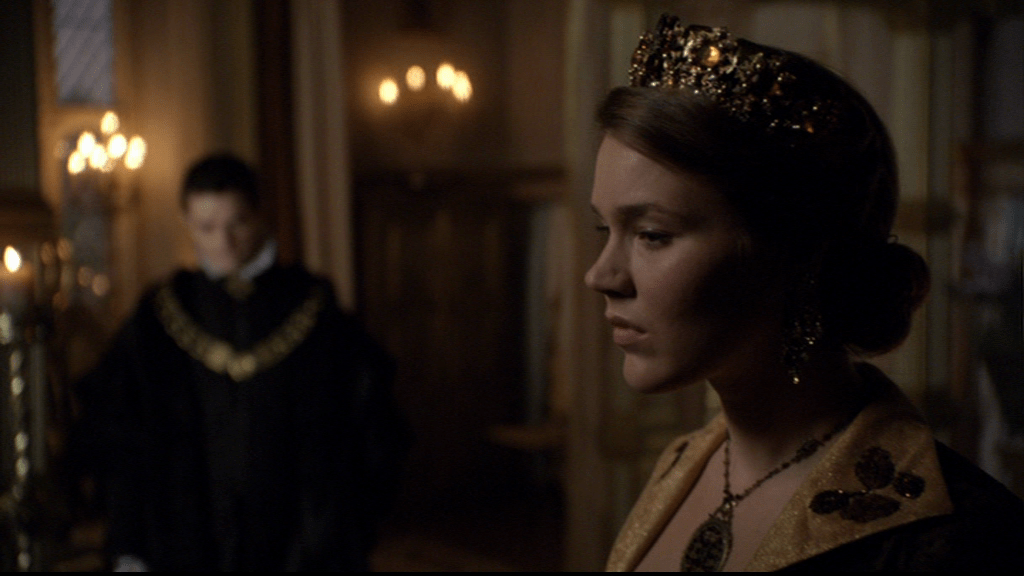
In The Tudors this has all been brought forward so the Anne of Cleves that gives Mary the news is hesitant.

Anne asks Mary to sit, and then kneels in front of her. And the news hits as rough as you would expect.

Mary is brittle like a ramrod, and just sucking that pain right back up that had momentarily escaped from her for some reason. She’ll be fine. She just needs to be somewhere now. Thank you.
By the way, if Henry had ever given a damn about the fact that Mary really wanted to marry, Duke Philip of Bavaria was probably the best shot she had while still a comparatively young woman. Mainly for the reason she just quoted its being impossible, that he was a Protestant Lutheran. Mary was a prospective significant threat to an Edward minority government mainly when allied with her relatives that ran most of Catholic Continental Europe. Mary marrying a relatively low ranked Protestant avoided or at least lessened a lot of the issues previous engagements had run into.
He was far enough below her in general importance (it was a nice Dukedom, but he shared it with an older brother) that he could be expected to stay in England most of the time. It was also a way she could have married while not handing the possible keys to England over to the Empire. We don’t know if she and Duke Philip even got along actually historically but politically, this was one match that might have been workable for her in her father’s lifetime.
It just needed some will, but Henry had no political will to marry off his daughter. She was always too much of a threat. Henry was ailing (He’s got 7 years left at this point) and Edward was a toddler. So instead of the very conventional life she wanted Mary gets all her turmoil and to be utterly magnificent while bearing it. The score has an actual bell tolling in the background as you watch her force down that pain and walk away.

That Actual Historical young woman went through an awful lot of pain, a large amount of it inflicted by her father, and obtained absolute power about 13 years after this in a fevered religious revival atmosphere. Her future country really could have stood a bit less toughening up for that young woman.
At the very least she deserved a friend bearing a listening ear, Prosecco and a scone.
Taken to Church
Christ Church Cathedral, Dublin makes an appearance for the final episode.

As discussed before, Henry issued a lot of bills of attainder. No one had to go to court, there was nothing to judge, The Crown produced a document saying why you were guilty, Parliament voted, and then you were guilty. Cromwell had made good use of them in his years of power. He was convicted with one. The irony was rich.
It was June 17th before the bill got to Parliament, and an awful lot of Stephen Gardiner’s dialogue here comes from the original bill, which was, by all accounts a bit histrionic as legal documents go. Everybody in the crowd knows to join in and freestyle a bit whenever Gardiner gets to the word ‘Traitor’, and while Gardiner introduces his subject,

I’d just like to note that, if you look bottom left, Henry ordered snacks.
Gardiner leans into Cromwell as heretic, and the original charges certainly have his stamp on them. The conservative faction once again was leaning forward, and wondering how much could be turned back once Cromwell was gone. Was it Cromwell, stopping everything from going back? Gardiner certainly spent a lot of time in this period, actually historically and in The Tudors implying that it was, presumably hoping Henry would pick that up and walk it somewhere.
Gardiner moves on to a presentation of utterly fictional dinner theatre (Yep, still in the original charges). (5) And actor Simon Ward gives us the vindictive and slightly ridiculous side of Gardiner with relish.

It’s a real hit with Brandon who jumps up and yells ‘Traitor’ in a lull with some proper bloodlust.
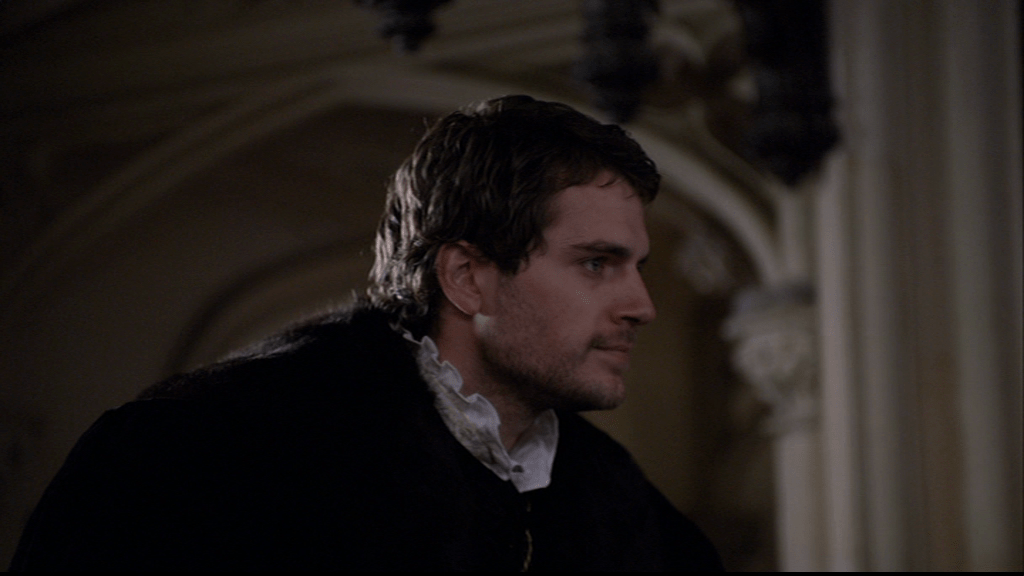
Edward Seymour takes advantage of the hubbub as the group now get another wave of ‘traitor’ yelling going round the room, to nail down exactly where Richard Rich is now going to be in all this. In his response, the Actual Historical words Rich uses are from another ally of Cromwell, Thomas Cranmer, the Archbishop of Canterbury and quite the absentee from The Tudors, moving forward(q).
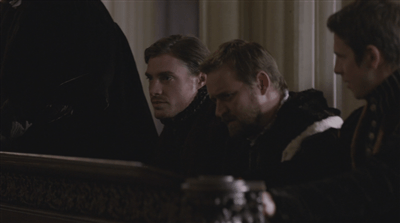
Cranmer’s response to Cromwell’s arrest was as milquetoast as the one he sent when Anne Boleyn was arrested, It was another letter to Henry and like the last one it agreed with everything Henry did and then asked the equivalent of “Are you sure? I thought he was good?”. And just as it was when Anne was arrested, while it was little and did nothing it was further than anyone else would manage to go, literally sticking their neck out for the accused.
You need a vacation
The atmosphere is a lot lighter for the viewer in the next scene, a meeting between Anne and Henry set on 24th June 1540, when Henry sent her to Richmond Palace. (6)
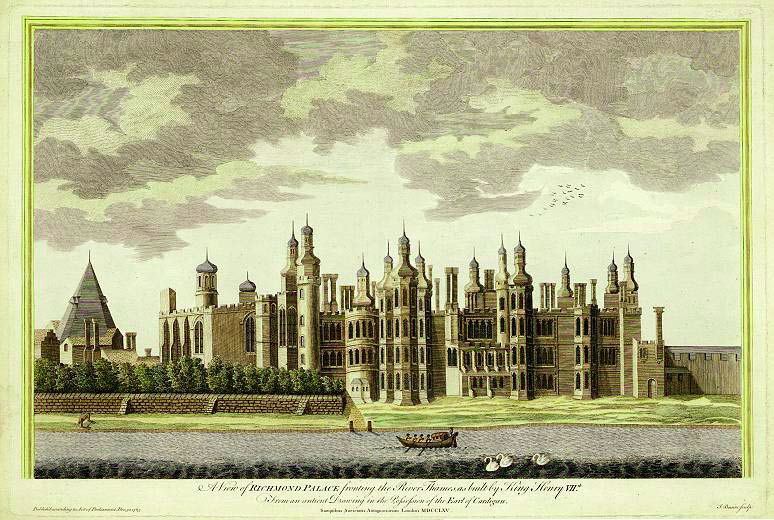
It’s not so great for at least one of the characters involved. We know Anne has a pretty bright future for a wife of Henry, but at the moment she is terrified. It is the Guinea pig, and the Reticulated python on hunger strike energy all over again, except this time the Retic has managed to kind of fake an air of contentment. It is really quite creepy.

Also, I need to mention the accessorizing to Henry’s outfit.
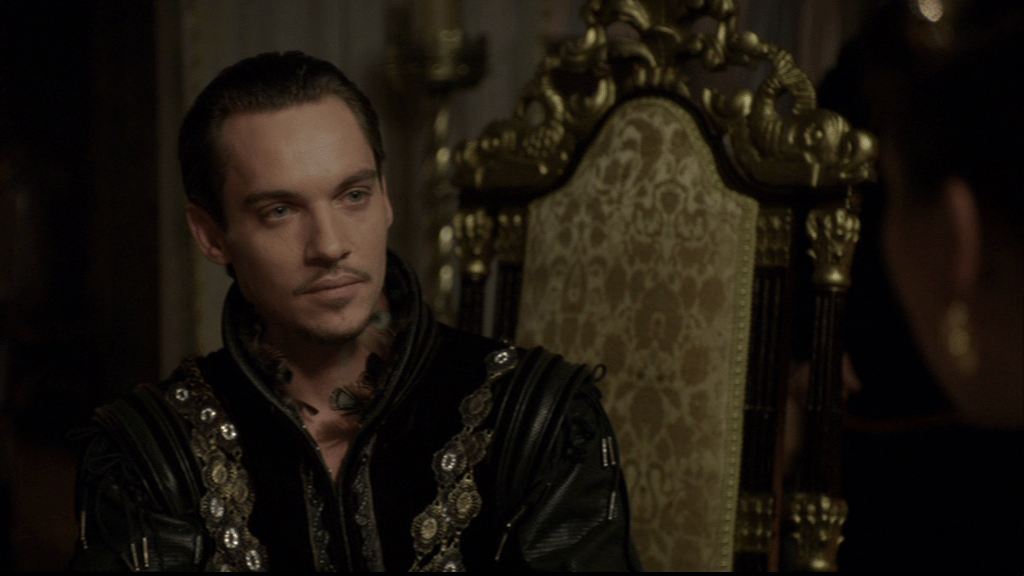
However once Seymour shows up Henry gets up from the table, and from the cover of the corner of the room gives her a look of loathe.

Seymour explains that technically, the Church of England could just declare an annulment. But there’s that international angle to consider. It would be better if they had evidence that the marriage was never consummated.

Or, as Henry would put it in his evidence to his commission of bishops looking into the legality of this marriage –
“I never for love of the woman consented to marry.” (7)
And that’s where contemporary interest in personal consent began and ended. If you wanted the legal system to give the slightest shit about what you had or had not consented to in your heart when you made that marriage contract then you needed to be a King, and you needed to refuse to have sex with your wife. Other than that, coercion was the starting point of a lot of marriages back then, and personal autonomy was basically the devil’s work.
Unless you’re Henry, then suddenly everyone needs to care about yours.
Henry still needed Cromwell to get him free of Anne, so he gave Cromwell permission to write (8), probably gave him some of the more decent Tower accommodation, and might have sent him some money for his expenses in prison(9). Henry still needed Cromwell, so Cromwell was kept on in hopes and doubts and fears for near two months.
Pretty smug Brandon
Early on in that time he was interrogated by his old enemy and one of the chief architects of his demise, The Duke of Norfolk.(10) Here, as it is done by Brandorfolk, it’s kept reasonably classy, apart from the bit at the end. Brandon basically walks in and gives Cromwell the news that Henry wants lots of supporting evidence for his annulment and that includes you, Cromwell.
His sins are mainly sins of style. His script is straight forward, but does things like lean on the Mister Cromwell, and there’s a lot of smirking.

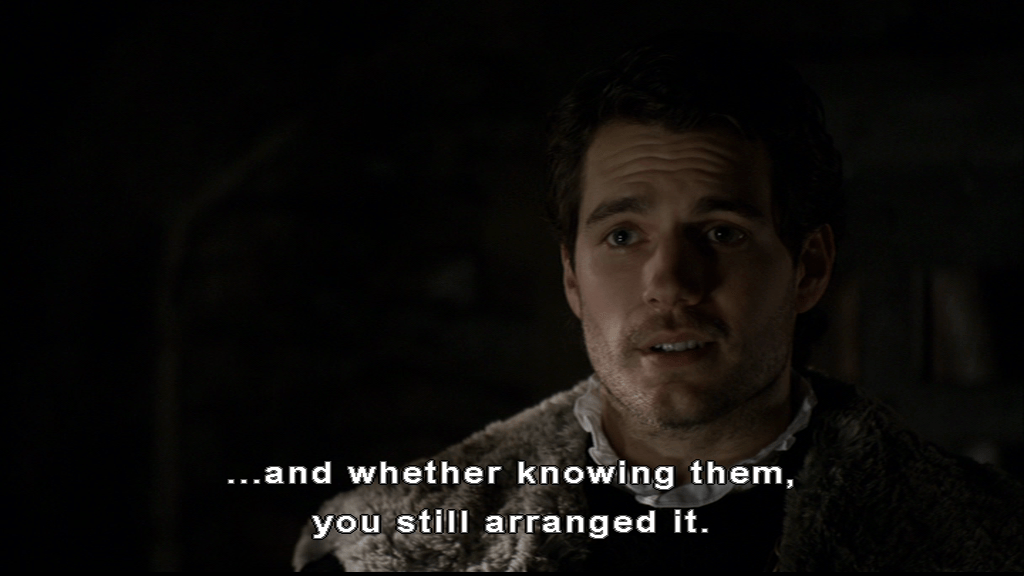
And while he does it he looks out of the window, like he’s checking something. As Cromwell agrees to do as Henry asks and proclaims a heart breaking amount of loyalty, we find out what Brandon was looking for.

He was checking to see if Cromwell could see his house. We are shown that he could, and did see it on that night (It’s not right, he didn’t live that local, but Cromwell seeing it is how Hirst gets this part of Actual History into the narrative).

And we mainly see the mob but The Tudors gets the taker of Cromwell’s worldly goods, down to the stuff inside his house, right. It was Henry that sent his men to Austin Friars within hours of Cromwell’s arrest, to inventory and take Cromwell’s goods (special reward for anything with implications) and seize the house. (11) Every estate Cromwell owned was forfeit. I think the moist eyes Cromwell gets at the end might be more to do with the fact that if Henry’s looting his house, he’s almost certainly never getting back to it. Actually historically, the lesser fortune, but now suddenly by far the most important money in the Cromwell family, was currently safe.
It took so much to come from nothing, so much luck, so much drive, so much intelligence put to so much use. And that might still all come to nothing if you had absolutely no money. As hard as it is to climb the pole in our era (with our very different problems) the odds against it for almost all of history have been so much higher. Money could at least get you into a profession, through education and apprenticeship, and the more you had, the more you were likely to make.
OK, some of the same problems.
So the bulk of Cromwell’s great fortune had gone, but he had signed a lot of land and houses and goods over to Gregory in the last few years, and as the weeks ticked by after his arrest no one came for it. Same for nephew Richard, sitting on significant holdings from the Reformation and still seen to hold some favour for his performance during the Pilgrimage of Grace. The other Cromwells might just be OK, and the money left would be enough.
In the letter Cromwell would write for Henry, right before the evidence Henry wanted he put in a plea in the place Henry was most likely to read it.
“Sir, upon my knees I most humbly beseech your most gracious majesty to be a good and gracious lord to my poor son, the good and virtuous lady his wife and their poor children.”(12)
Cromwell could only bet on catching moments of Henry’s attention and he found space to mention his son’s wife. He judged the connection to Jane Seymour’s younger sister and the aunt of the future Edward VI to be invaluable.
In return she would take that action I spoke about last time, and write to Henry denouncing her father in law, but the letter was damn late, quite close to his execution in July, when there was little else that could be done. Given Cromwell’s primary concerns, he would have understood her pragmatism (14).
After a brief look at the outside of the tower to show us some time has passed, we go to Cromwell writing his letter to Henry.
A tasteful three-way

When the voice over comes in, though, it’s not Cromwell’s voice. it’s Katherine Howard’s.

She’s narrating the story with a smart child’s interest, giving everyone characters and giggling at the parts where Henry says nasty things about that woman they made him marry. The Tudors puts this against silent moments of Cromwell, dirty and tired, composing the letter in the Tower.
Henry gets her to go to the end section of the letter and Katherine gets with the empathy program the moment she reads the part where Cromwell mentions being a prisoner.
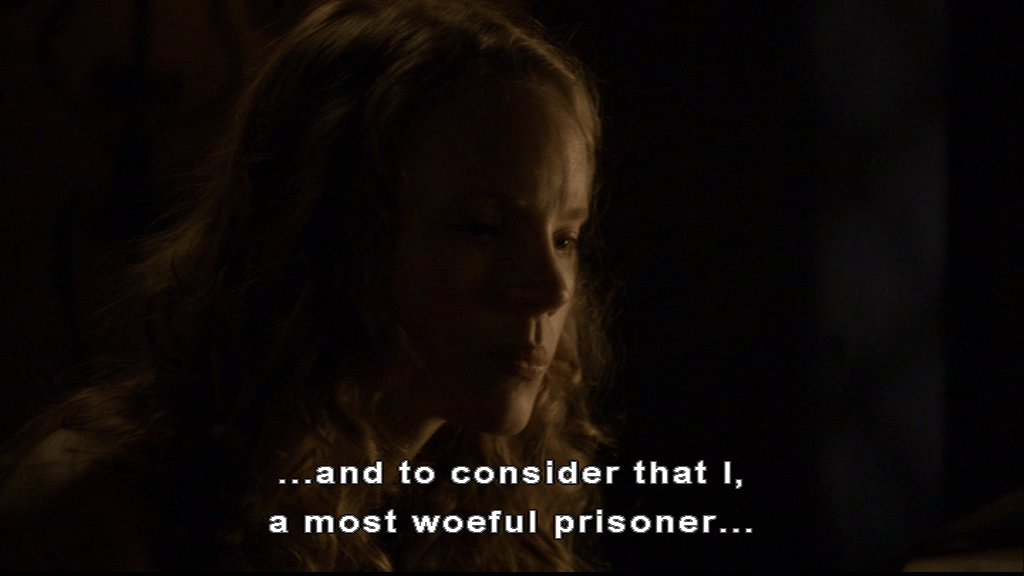
She’s serious from this moment on, no more voices or characters. There’s some long pauses caused by what she’s reading, Thomas Cromwell’s utter submission to Henry’s will and his desperation to be saved. After all, that total loyalty had got him this far. She and Cromwell divide up narration, and the letter she reads is similarly chopped, putting historical quotes alongside invented phrases.
The most actual historical quote is the closing section, which contains the phrase that rings out from history with all of Thomas Cromwell’s desperation to live. As Katherine gets to it she decides she’s not reading it. She draws Henry’s attention to it, and gives it to him.

“Most Gracious Prince, I cry for Mercy, mercy, mercy”(13)
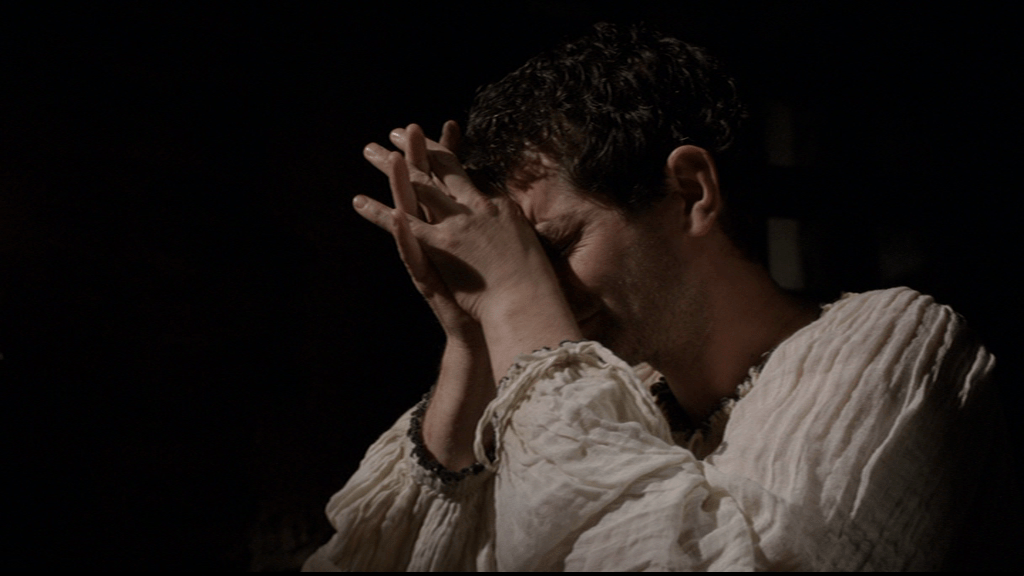
The chances were always small. Henry had got somewhat used to, whether deliberately or not, celebrating/enabling his marriages with a human sacrifice. His brother died so he could marry his first wife, making that a God given twofer. Wolsey died on his way to die so Henry could marry Anne. It was some time before the marriage but it was what she wanted, if she couldn’t have her predecessor. Her successor did better, Anne for Jane, obvs. No one for Anne of Cleves, Jane had died some time before he even started looking and they’re not really connected. Maybe that was part of the problem. Now Cromwell for Katherine Howard.
Another way of looking at the same pattern would be to say that Henry was repeating his early life and reign at a massively accelerated rate. He had an international bride he didn’t want, a young niece of Norfolk’s that he did, and a first minister that had let him down. Time to kill the Wolsey. What consequences could there be? He was becoming a pain, anyway.
He made him. If he him crumbled to dust, what was it to Henry?
Oh, and as long as JRM’s hanging out being conspicuously worked out and semi nude,

Then I must draw your attention to Keith Mitchell’s portrayal of a far more physically historically accurate mid 1540 Anne of Cleves divorce era Henry.

In the Company of Shitheels
Cromwell was a commoner and the sheer sodding delight taken in his fall was unusual and often related to his being a commoner. The language used by many to describe him, like Gardiner does in this scene as a churl, drew attention to this lowness, and gave them opportunity to express disgust. His career and life was an upset to the natural order, that nobility truly was a different, slightly better breed of human, capable of things that commoners just weren’t.
Upset a social order people base their value on and they get nasty. There was an appetite for Thomas Cromwell’s death to be humiliating and degrading, a way to make him pay for rising above his station as much as anything he pulled. Which is cleverly rendered in this nauseating little scene.
Katherine Brandon, Duchess of Suffolk is feeling very out of place as the lack of pity party has become an actual party, presumably in her court apartments.
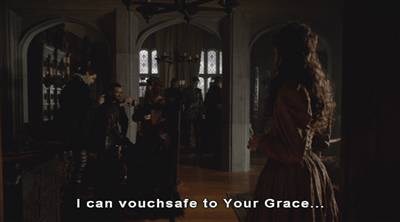
Yeah, as for that charges against Lord Hungerford, who did die with Cromwell, he probably had a nervous breakdown after being imprisoned, was accused of sodomy. He doesn’t look a particularly likely bet for a gay man in hiding but he could have been. It also could have been a charge there to shock, like incest for Anne Boleyn. The magic charge isn’t that convincing either, but that was historically what they leveled at him.
What? No, The Tudors there’s no record of even a charge of him raping his daughter, that one youappear to be thrown in for an actual audience shock moment (he did have a messed up relationship with one of his wives) because The Tudors subscribes to the theory that he was on the same ‘ticket’ as a humiliation for Cromwell. Actually Historically the reasoning and the charges don’t appear to be that cut and dried.
Still, this isn’t enough for Sir Francis Bryan and Tom Seymour.

Who are going to spend the evening scaling the depths of being pranksters who are asking for a decent assassination attempt. Edward wants to know what they are up to but the Duchess, who was Actually Historically increasingly Protestant leaves looking uncomfortable and Brandorfolk has a moment.

Brandon needs to drop being an asshole for season 4. So this is where he gets off that train. Tom Seymour and Sir Francis are up for a longer ride, so they get Cromwell’s executioner unbelievably drunk.

Well, if we ever wonder what were doing as a species, at least we no longer go to outright sadism for our jollies. Seymour and Bryan are made of the same stuff, but with less empathy. The Tudors just were a lot less caring. Caring wasn’t a great survival tactic.
How botched was Cromwell’s execution? One account has two headsman hacking at him for an impossible half an hour (15), some plump for around three blows,(16), but most just say he was beheaded, nothing else to report.
The Tudors is kind of going to go to town on it.
The executioner was a man named,

Who was maybe not rated that highly. And with a lot of experienced executioners available for such an important day, and with the fury that Cromwell provoked, it’s hard to believe that if there was significant botching that it was coincidence. The Tudors has Cromwell’s enemies do it, by getting Gurrea blind drunk.

Yeah, more punning, less sadistic pranking, Sir Francis. I’m fond of this Cromwell, he’s not my favorite but he’s being given a long ass difficult walk to his execution. He starts it in the next scene so it’s time for…
Goodbye Great Statesman
Father of Parliament, King Henry VIII’s most loyal and capable liege man. Committed Protestant. Loyalty unto death was promised, and Henry’s going to get that. It was a good Cromwell, a considered Cromwell that The Tudors gave us. Just not my favorite.
There’s been a few Thomas Cromwells committed to film by now. He might have been a walk on part early on, but he was one of the first characters to emerge around Henry and his wives. My least favorite major portrayal is his latest incarnation.

As I’ve said before, the version of Cromwell in the filmed Wolf Hall adaptation is basically a 21st century guy in a 16th century character. It brought out a lot of the good qualities that Actual Historical Cromwell really had, but it also utterly refused to acknowledge the bad qualities and the concerning incidents about him. The man basically sits there, stunned, and asking the odd question as the Anne Boleyn prosecution just unfolds around him with a lot of spontaneous confessing. He was a pretty regular advocate and orderer of torture, so his role as Wolf Hall’s early anti torture activist also sits uneasily.
And I don’t like the casting. I think Mark Rylance’s, um hyper, hyper naturalistic, de-delivery (you know what I mean) is interesting and brings a lot to a lot of characters but I don’t think it works for Thomas Cromwell. He was a big man that could be physically intimidating, pretty damn confident in his abilities and his control of others and by the time of his rise he was surely a man that would have dominated any room he was in. It is certainly the way in which he is described by contemporaries.
And what Rylance gave us was like, light years away from that. I’m not saying it was bad acting. I think he was mis-cast. I know how popular that performance has been. It’s not my Cromwell.
Then there’s James Frain.

My middle child Cromwell was a well balanced version, that took far fewer liberties than previous portrayals. It was still a sketch compared to the biographical detail packed into Wolf Hall (no time for him being a widower) but Hirst made good decisions. Leaning in to Cromwell’s religion was a smart choice. This Cromwell is fine, and gives us insights into early Protestantism and early modern politics. He has been really softened up in the second half of his final season, The Tudors really wants your sympathy for him so it skips his ruthless actions against the Poles and the Catholic faction. And he’s just been generally softer, The Tudors irons out the actual historical contradictions of the man a little too much. Nice Cromwell, not my Cromwell.
He needed to be a little bigger, a little meaner, I need a sense of pragmatic ruthless genius on the scene.

My favorite Thomas Cromwell is in Thomas More’s propaganda piece, A Man for All Seasons (1966 film version), and played by Leo McKern. He is utterly without scruple in his pursuit of Thomas More, but he’s really just here because it’s what the King wants. He’s not actually portrayed as that much of a monster, even trying to throw out some compromise ideas to More through his friends, as well as trying to get his friends to help prosecute More, for as long as compromise was still possible.

He’s got a great line in wry humour, when it all gets a bit dark, too.
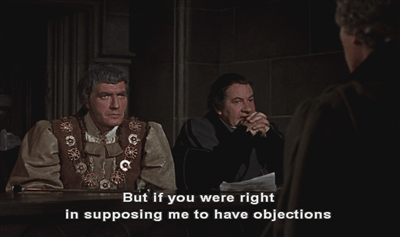
That’s my Cromwell, for the moment. Ideally I’d like the detail of Wolf Hall’s version , the balance of The Tudors‘ version, and a performance with echoes of A Man for All Seasons’ version.
But until that Frankenstein emerges, The Tudors’ and Frain’s was a solid Thomas Cromwell.
First Sweep
The noise of the inside of the inn entirely disappears. The only noise is the wind and the tall grey walls of the Tower are everywhere on execution morning (28th July 1540) as we get a glimpse of what has to be ‘Mad Walter’.
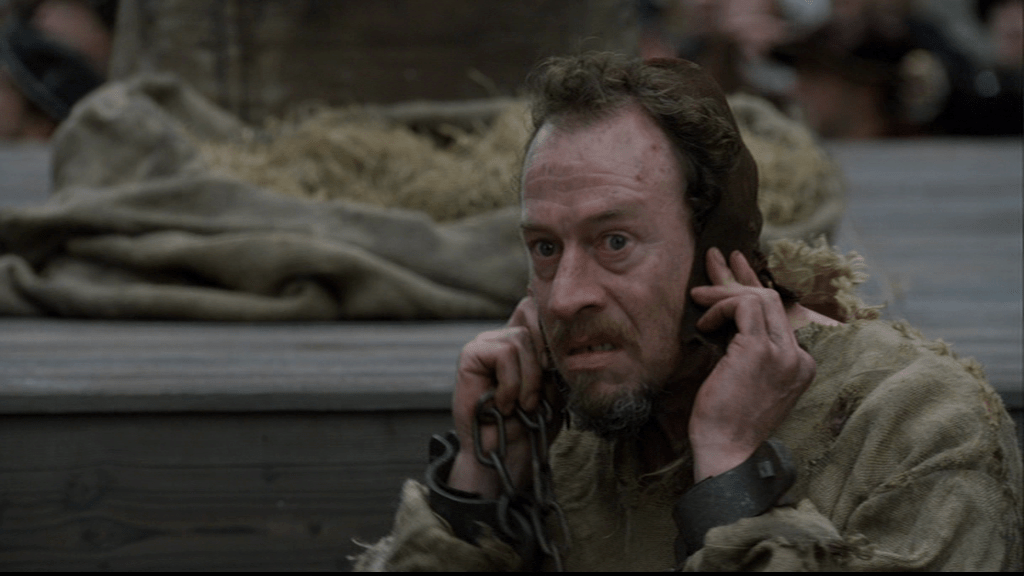
And then Thomas Cromwell walks out. All the sounds are still muffled, his chains sound like they are in the distance. Then the sound slowly comes in as we get a scaffold’s eye view.

Sir Francis Bryan saunters over, to make sure his human butchery jape is still on schedule.
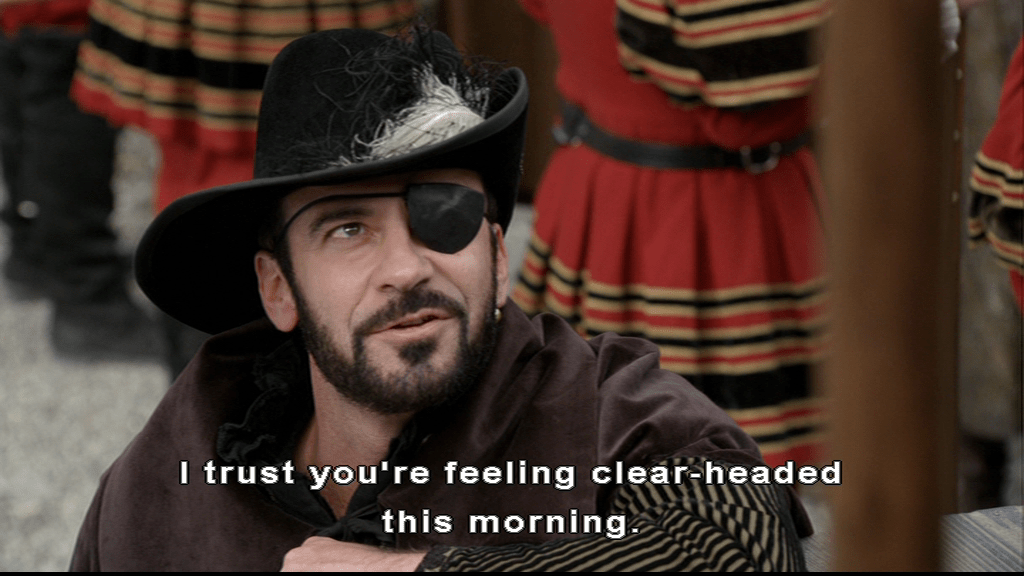

Oh, wow. He is almost ‘not in the room’ drunk. And hungover.
Surprise! This time it’s not the wife
We cut to Queen Anne, who doesn’t look to have moved but Actually Historically she was in Richmond palace for this. She got moved there on the 24th of June, and Henry’s commission sat for three days before it declared their marriage invalid and she heard it around the 6th of July.
In The Tudors it is Edward Seymour (with some silent backup Councillors) that delivers the news, he’s quite sharp until the worried Anne signals she consents to the annulment, and then he warms up as he tells her what she’s won.
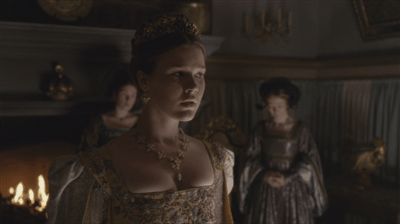
Anne gives her part of her actual historical response, that she did ask that she might sometimes “have the fruition of your most noble presence”, to Henry, which was a graceful way to end it. Once they are out the door she collapses and we see just how much pressure she’s been under.

In her Actual Historical letter to her brother she would write:
“Only this I require of you, That you so use yourself in this matter (that) I fare not the worse, where unto I trust you will have regard.”(18)
So yeah, she seems to have had concerns.
Second Sweep
Meanwhile, Cromwell continues on his long walk to execution. Terrible news, Gregory managed to make it. Actually Historically he’s not known to have attended, given that they were trying to keep the rest of the family clear of this it would have been insane.
Instead Thomas Wyatt made it, was seen to be distraught, and he’d produce some more traumatized poetry about the loss of Cromwell (19).

In The Tudors, Cromwell claps Gregory on the shoulder and gives him a steady look. Then he mounts the scaffold and starts a pretty long ass speech. By all accounts Actual Historical Cromwell gave a pretty long ass speech at his execution and the version The Tudors goes with is cut from accounts in Hume’s chronicle, Hall’s chronicle, and a frankly slightly dodgy one (it’s all a bit early Protestant propaganda) in Foxe’s book of martyrs, all modernized somewhere from a lot to a bit. There’s also a couple of lines from the always highly dodgy Spanish Chronicle version.

Cromwell’s doing well until Mad Walter can’t contain himself. It throws Cromwell off and he is ugly crying a few seconds later.
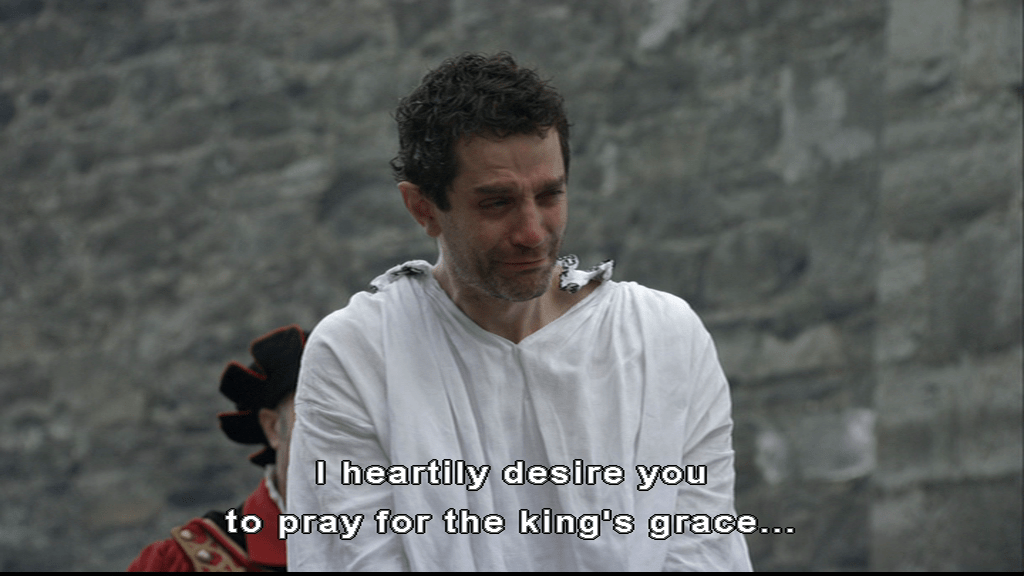
Nonsuch Palace
We continue to hear some of Cromwell’s speech but we also cut away to where Henry and Katherine are visiting the newly completed Nonsuch Palace (the main building work would be finished in 1541).


Katherine is suitably impressed and they’re basically honeymooning. If it’s supposed to be the same day as Cromwell’s excution, that was the day they actually historically got married.
Then we go back to the Cromwell’s execution. On the day that will be Henry and Katherine’s first anniversary next year.
Sweeps Three, Four and Five
Cromwell finishes up his speech and just has one thing he wants to check. He just doesn’t want to suffer.

..aaaand then he sees the state his headsman is in. Like I said, botching not that solid historically, The Tudors is going to go to town on it.

He finds some real courage at the end, for a man who was breaking down earlier. It’s been coming so long it’s like it’s been in the post, and we get to watch along with his son as Gurrea tries and fails,
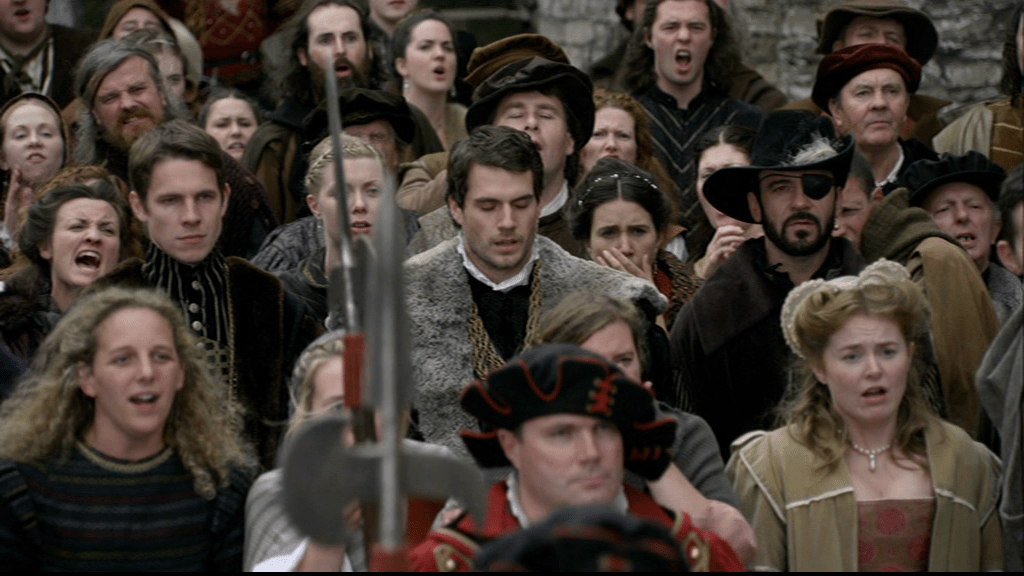
And tries and fails,

And tries and fails, the third one being this below the shoulder miss,
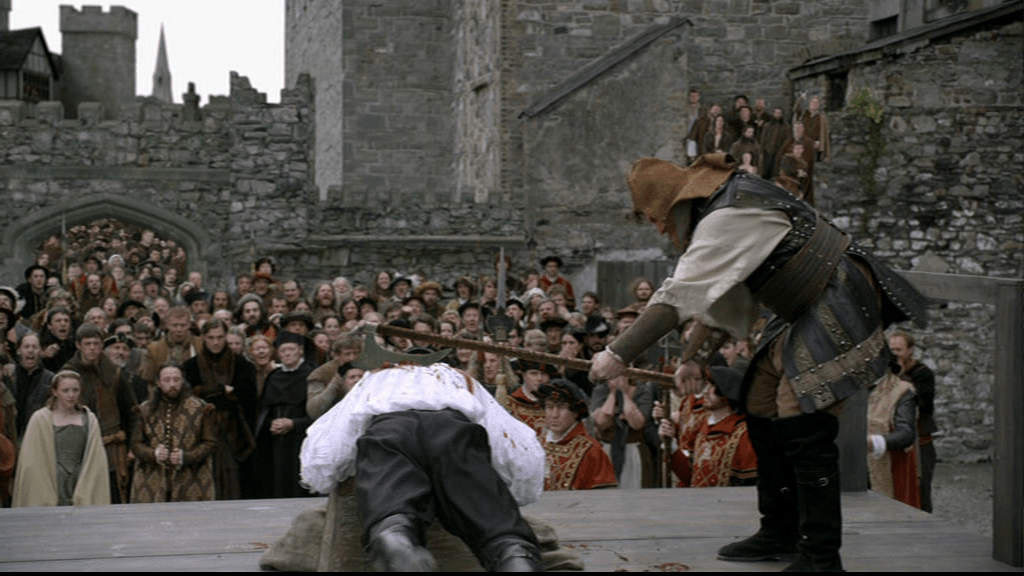
And tries and fails,

at decapitation. Finally a beefeater wrestles the axe away and finishes the job.

And Cromwell is now definitely dead. After his head was displayed for a while he was buried in the church of St Peter ad Vincula in the tower.
Here comes nothing
We cut briefly to Henry sat watching Katherine swinging naked on a swing.

Henry could afford to let Cromwell die when he could have let him go. He also seems to have planned Cromwell’s death at points. Henry was naturally the most exaulted of people and Cromwell had served his purpose, he could go back to nothing.
Except, sometimes Irony and History get reaal drunk, and Justice gets poetic.
Henry reduced Cromwell, took every title and caused him to be known as a plain ‘Shearman’ before his death, just like his father. It was his oh so low breeding that everyone objected to.
So it’s kind of funny that the monumental vengeance that would be wrought not just on the King of the time but upon the institution of The Crown would arise from the base future lineage of Thomas Cromwell.
Henry would have a Grand great great nephew, a direct line descendant of Henry’s sister, who would inherit the crown. He was Charles I.
Thomas Cromwell would have a Grand great great nephew, a direct line descendant of Cromwell’s sister. He was Oliver Cromwell.

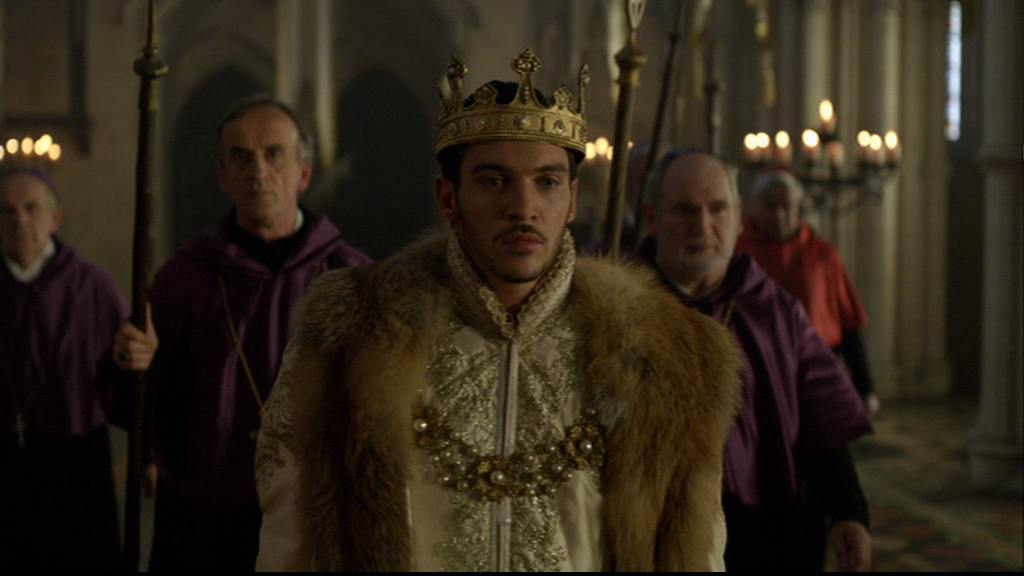
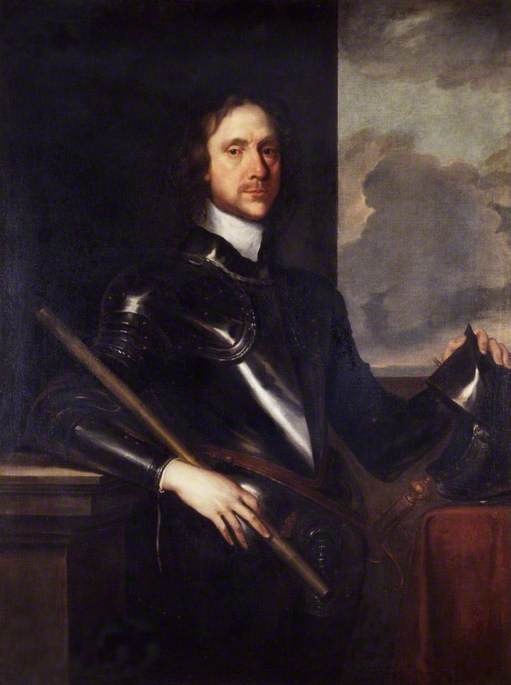

The money saved was important, because it meant that Oliver, son of a second son of a guy that did reasonably well under Elizabeth I, got a Cambridge education and set up as an MP, in the period when Parliament started breaking with the King.
And it would turn out that the next iteration of Cromwell was, as far as talent went, a cross between Napoleon and Thatcher, and about as flexible. And what the Cromwell line had been shedding in its near century long quiet fade was all scraps of deference, and religious uncertainty. And it produced a man who, in the depths of the Civil War, helped bring into being the New Model army, commanded it to become became the original model Old Ironsides, and thought:
“God would, by things that were naught, bring to naught things that are”
Before strapping on his unflattering headgear and going out to the field at Naseby to bring this King, this man of blood, to justice before God.
Even in the face of a king who was terrible at the job, had got a lot of people killed, switched allies every six months, and simply would not accept a deal, The Crown still had great power, and some members of parliament were buckling at the prospect of killing Charles after his final defeat when Cromwell told one of the judges:
“I tell you we will cut off his head with the crown upon it” (source)
Charles I walked the last few steps on his own, out the window of the Banqueting House, onto that tall scaffold where he and The Crown as it had previously been in England got executed. But Cromwell had had to fight and drag him there, Charles basically screaming out his rights and refusing to acknowledge any other authority, ever. Oliver did not waver.
Once Charles was dead , Parliament went wobbly, and Oliver the commoner did the job of King like he was an Elizabeth I who was into conquering shit. Charles II might always have dated his reign from the day his father died, but practically his road to King only started the day Cromwell died. Someone else really did rule for all that time.
The Crown was never the same. If The Crown must always win, it is perhaps because it senses the losses, that it used to be more, and it is now an alloy will never be that powerful and pure again. And of the doubts that dance around it, and for the hand of the commons now permanently wrapped around it, every monarch inherits a large part of their crown from a Cromwell.
Careful who you decree a footnote.
Hey Henry,

Tick
The Tudors Recap – Season 3
January – December 2020
78,796 words
And the bibliography is on the footnotes pages now.
Merry Christmas, reader.

This was BRILLIANT. So many things to comment on and by now you have a sense that I can ramble on a bit. There are too many things to comment on that you wrote about of interest to me so I will try and minimize. And focus. Focus (ahaha like that’s going to happen).
First what a interesting way to look at Cromwell’s death. Both a very fabulously intelligent theories and observations I had not made so thank you! Not that I think it was fabulous that he died this ‘falling down the hole into terror’ manner or people were so vicious. I know…he did many distasteful things and he didn’t have much of an internal compass of morality. He seemed to worship the king and want to further the Protestant religion by Completely you destroying the catholic religion. They didn’t give much respect to private belief systems did they? I mean I know he saw monasteries as evil and corrupt systems that should be rid of and go into the kings coffer….but just like ‘I believe the sky is blue…no it’s purplish pinkish blue as it’s setting…no it’s f’ing blue- just say it you don’t have to believe it! No I really think it’s ….THWACK …head rolls (I am NOT minimizing anyone’s religious beliefs at all I’m just saying people couldnt have differing opinions meh..) However, it seems to me an awful LOT of people have a sort of moral relativism. (Gardiner you are a total pompous theatrical jackass in this episode. And many others. What’s up with all of the going for the jugular with relish? It’s really terribly upsetting to see people act so vicious. I don’t just mean Cromwell’s death et al., there are so so many things. I’m humming ‘what do the simple folk do’ in my mind….Oh I feel better. Shew. Still, I think it’s awful that on the show they had a day of it getting the headsman wasted to botch the job….I had to talk to Brandon about that and how we couldn’t be friends if he was going to be an total dick and asshat. I reminded him he resented Cromwell as it hurt his marriage. Or brandfolk/ I told him he needed to get his shit straight. I mean sinking to this level is just sooooo ….nasty. It’s not becoming guys. Come on. You going to do a circle j$&rk in a moment? Gross gross gross behavior.
So you compared the death of Cromwell to two different circumstances. The second one is the accelerated path of his younger years. Wolsey, for Anne Boleyn. Cromwell for Catherine. (I’ll say that Henry may of been intelligent but is emotionally blunted and has the emotional intelligence of a toddler. A very dangerous toddler. I like toddlers, I don’t like Henry much. Children are egocentric as it’s developmentally appropriate; Henry is a narcissist asshat. Also, did he just like the name Catherine or were like 3 out of 4 females named Catherine then? Or did he just not want to learn new names?? Oh that’s it. Women= object = Catherine? (Did you see how Seymour walked around her like she was horseflesh when they first met? Asking who taught her to count. Dick. I would like someone to examine you that way and talk in front of you as though you weren’t there.)
Sorry got off track….Then you mention that Henry didn’t want his first international bride (nor his second). I didn’t know that! Henry didn’t want to marry Catherine of Aragon? Well knock me over with a feather! Seriously I didn’t know that (there is a WHOLE bunch I don’t know. In my area we are trained to rely on empirical evidence but also in the medical world they have like no tolerance for ambiguity- like a zero tolerance policy for most. Which annoys the crap out of me as there is so so much that is not known about the human body and medicine. I HATE when people think they know what they don’t know…wait, that made sense to me, anyone else? They teach that in the beginning, that medicine is always evolving but then most forget it and turn to answer when they hear ‘god’ like it’s the cocktail effect. (You know when you’re at a party and there’s lots of noise but you hear your name for some reason- thats the cocktail effect and I didn’t just make that up. I don’t think.) I think some people just decide to act like gods or ‘lil’ Henry’s if you will and they are just always right – see? By the labs. Or because god chose you to rule. Yep. Sure. Fine to the dude that rules. Or maybe it’s not all that, like Francis talking to Anne- does the whole ‘heavy is the head that wears the crown’ thing in an earlier episode with Anne Boleyn. (Actually he just said he would not choose to live this life if he wasn’t born into it as it’s easier to have nothing than everything or something like that….tell that to the freezing starving people but I suppose there must be some truth or it wouldn’t be a saying. I myself have never worn a crown. Oh people got me tiaras at a party in grad school but not same things except I could order people to drink…oh what a heady power trip haha….kidding, I’m not the princess type. I actually tried to curtesy like lady Mary and fell Over laughing…ahahaha. Another tangent sorry. Dang it! So I like the two ways you explain Cromwell’s death. They both make sense and they also both make Henry a dick (sorry to all the ‘Henry wasnt such a bad guy’ people. To me he is just sort of a jerk. I mean I see his human side, his belief in humanism when he was younger. That turned into henryism……) okay I know this was long but there is a lot of interesting observations in this one and I had to comment! Despite the gruesome end it was a great show and this one of the best recaps in my humble opinion. Love love love it! Please please write more. This was the last one to read but I’m going back to the ones I skipped. I just asked some fairly ambiguous question in the middle of watching this show and your blog came up! It was the only site that approached the question. I applaud you….now please write more…pretty please with sugar? Okay I’ll stop. I’ll try anyhow, can’t make promises I might not be able to keep….
LikeLiked by 1 person
Oh by the way when I used the term ‘circle jerk’ I Wasn’t trying to be crude- I meant the definition of a group of like minded people talking to and supporting each other, egging each on if you will, taking part of a discussion with people that may have the same goal or bias ….naughty minds. You know like when the group asks for Gardiner ‘so now we can begin’ you know no one in the room is going to cause dissension. It is a total Destroy Cromwell meeting where they all desired his end. They are all rooting for Cromwell’s fall and in fact are actively trying to cause it, as well as behaving like a group of girls turned into mean boys. Also, a couple in the group are planning a sinister and sadistic plan that works within the groups pep talk. Read the room. That is a circle jerk. Basically doing the ‘you are so right dude, I am so right, great point, you’re awesome, I’m awesome, guy to the left is awesome; let’s all high five and pat each other on the back….you get the picture. Simple death wasn’t good enough eh? Let’s plan to make you suffer for rising so high and punish you to suffer from his ‘base’ background and not being born into nobility. Cromwell knew having a huge amount of power was a social faux pas for his low background but I think he truly wanted for people to get postings and possessions of peer based on merit only, not for being a blue blood. However, I l don’t think that he knew the extent of hatred these people had for him for being so ‘base’ and risen so high. I know that you said the Seymour clan didn’t join in until the end in Actual History you said which makes far more sense so thank you for explaining that is not what happened. As they are fairly new men…pot pot kettle black. They weren’t as low as Cromwell and their sister did furnish the golden boy/ heir…and the king fought alongside their father in the battle of the Spurs I believe. Still, they were not high profile nobility so it didn’t make much sense to me and you kindly explained why. It’s because it didn’t quite happen like that. Was Brandon being branfolk again? Is something Norfolk’s grad lineage would support, rid themselves of this nobody. Although the Seymours should in time rise very high, but you know the saying the higher you rise the farther you fall (and if you want to add physics and the psychological aspect as well- the harder the fall). Okay I just wanted to clarify that so people don’t think that I am pervy and coarse. I re read it and was like ‘isn’t that something that has another explanation that’s pretty gross to me….and actually had to look it up and was very embarrassed. Eeew. I’m sorry! I was grossed out truly when it gave another definition….sorry wash your eyes out with soap!!
LikeLiked by 2 people
Excellent recap of the entire season! I hope that you had Happy Holidays and have a wonderful New Year. I’m hoping that you will blog out season 4 in 2021.
LikeLiked by 2 people
Okay I tried to like this post but it keeps bring me back into signing in. I may very well be a special kind of stupid…but I agree with Kris, it’s an excellent blog and thank you. Hope you have a happy new year! As well as blog Season 4 in 2021:) I have thus far restrained myself from watching episode 1 on season 4 because I enjoy reading the recaps before watching them (I have seen all seasons/episodes but it make it’s so much better to read your blog first!) thats restraint for me 🙃 thanks again for all of the time and effort you put into these delightful recaps!
LikeLiked by 2 people
Okay, I’m a bit embarrassed to admit this but I didn’t know about Oliver Cromwell and spent my insomnia filled time reading about him and the development of what seemed to be the end of absolute rule by monarchy. Being an American, we don’t learn as much about your history (some in college if you choose but I have really just read a lot from historians such as yourself). I suppose America’s education is, you know, about America or as some call it HIStory. The settlers, revolutionary war, expansion out west, civil war…so I was amazed to read about Cromwell’s ultimate impact. I know systems were in place (magna carta) so on that were supposed to prevent absolute rule or totally tyranny but it seems to me Henry got what he wanted and no one was out of his reach. I know I could be wrong about this as well but that’s how it appears to me (and I do not have a formal
Education in this area so if I am wrong I woudnt be surprised). Anyhow, thank you for adding that. I have read so much about Cromwell because I started reading about the cousins war or war of the roses to the end of Tudor rule and I have never found anything like this- mentioning how Cromwell’s ancestors change the monarchy. This is probably common knowledge if you grow up in England ??? However, I had no idea. Our history is pretty specific to the development of the United States and the world wars (even that isn’t very through, I saw Kenneth burns talk about why he was documenting world war ll and he had polled high school juniors and over half thought that we were allies with Germany then – that scares me because we clearly learn that and I guess those kids were absent or asleep…). Thank you again for furthering my understanding. There is so much to
Learn about and I wish I had taken more classes in college but I was a bit everywhere before I decided my major and then just focused on those areas. I have looked at a lot of your links and references and what an incredible amount of work you put into this! Thank you again:) someday I wish to visit (I have been to France a couple of times which was wonderful but I haven’t been to England.) I went first when I was 12 and what struck me was how young America is in relative terms of Europe. So much rich history. Applause 👏🏼 to you and your contribution as I am sure many people learn as I have from your blogs while also thoroughly being entertained and I have not read one that hasn’t made me laugh (I haven’t read all of them, I’m going back but I can’t wait for season 4!!) I know, I know you have a life outside of your blog and I’m not being pushy just appreciative I swear; I just look so forward to it! (Btw, I love the little pic you gave me, looks JUST like me haha!, seriously I love it!)
LikeLiked by 1 person
I see it’s 2021 where you are so Happy new year!! We will celebrate in a bit but I would be very remiss if I didn’t say 🥳 happy new year as it’s a bit after midnight there I think! I have had a better December bc of you and with all that’s going on with Covid, and the circumstances I am in require that I am home all of the time so you provided me with some of my favorite things, learning, and laughing really hard:) so here’s to you in 2021 and Happy New Year!!!! I am a fan and thankful for your hard work (but not like a creepy fan way haha…just an appreciative one and given my circumstances I read and watch shows much so I am glad I found this jewel!)
LikeLiked by 2 people